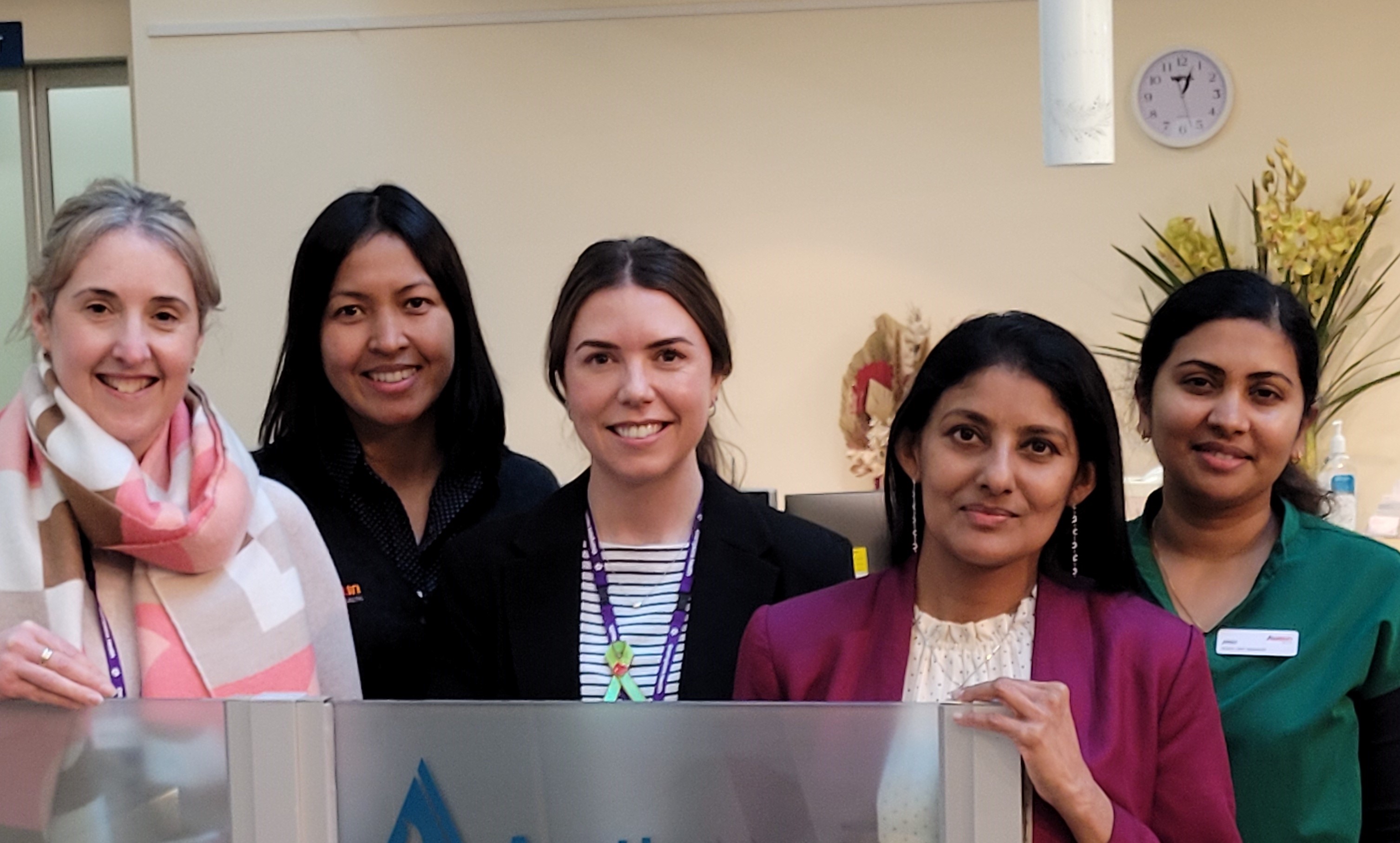Radiation Oncologist celebrates improved access to treatment for 50 cancer patients ahead of Gynaecology Awareness Month
 Michelle Braybrook (Clinical Trails Coordinator), Lucille Scott (Radiation Therapist), Jayme Goldsmith (Colorectal Cancer Coordinator), Thanuja Thachil (Radiation Oncologist) and Jinu Andrews (Nurse Unit Manager).
Michelle Braybrook (Clinical Trails Coordinator), Lucille Scott (Radiation Therapist), Jayme Goldsmith (Colorectal Cancer Coordinator), Thanuja Thachil (Radiation Oncologist) and Jinu Andrews (Nurse Unit Manager).
A Ballarat Radiation Oncologist has helped deliver more than 1500 treatments closer to home for cancer patients since the introduction of a Gynaecological Radiotherapy program.
Ahead of next month’s Gynaecology Awareness Month, Dr Thanuja Thachil will mark the significant milestone of providing 50 cancer patients with treatment locally, saving patients hundreds of hours in travel time to Melbourne.
The success of the program has garnered significant attention among leading medical specialists, with Dr Thachil recently presenting at a Victorian State-wide Radiation Oncology Meeting.
While the Grampians Health Medical Oncology team provides chemotherapy and other treatments for gynaecological cancers in Ballarat, most patients who require radiation therapy for gynaecological cancers previously had to travel to Melbourne for those treatments.
As a strong patient advocate, Dr Thachil is proud to have advanced the gynaecological radiation oncology service to complement the existing comprehensive cancer care provided at Ballarat Regional Integrated Cancer Centre (BRICC) at Grampians Health.
Her arrival has led to improved local offerings for Grampians patients, with expertise and support services for patients with gynaecological cancer, available in Ballarat. The radiotherapy service within BRICC is a long-standing collaborative partnership between Grampians Health and Austin Health, which has seen a highly skilled team of radiation therapists, medical physicists, and nurses partnering with Dr Thachil to deliver this new service.
“I believe that patients have the right to receive treatment close to home wherever possible,” Dr Thachil said.
“External beam radiation treatment can mean appointments every day for five to six weeks, which would mean a lot of travel or relocation to Melbourne. It’s a huge advantage to patients to be able to deliver that treatment locally.
“Most of these patients have such complex psycho-social situations, and hence the worst thing you can do is to dislocate them from their family and their existing support systems at the challenging time of treatment. In some cases, it can even mean patients being unable to complete their treatment course, or not having treatment at all.
“Through BRICC, external beam radiation can be offered at Grampians Health. However, some patients may still have to travel to Melbourne for a component of the treatment using brachytherapy (internal radiotherapy).
“We work tirelessly with our patients, their caregivers, other medical specialists, social workers, dieticians and the entire treatment team to get them through this challenging treatment and to address any side effects they may have – not just the immediate side effects but also the longer-term ones too,” Dr Thachil said.
“Our links with the radiation oncology services in Melbourne enable us to collaborate on cases, establish methods for peer reviews, and coordinate access for brachytherapy if and when required.
“I am privileged to be working with such a dedicated regional team, and to have linkages to specialist metropolitan units in order to fulfill this task of providing high-quality radiation oncology services to patients with gynaecological cancer in the Grampians region.”
The expansion of the Gynaecological Radiotherapy program has also led to the development of a consumer co-design quality improvement project, championed by a previous patient. This project is focused on improving the supportive care needs of female patients both during and after Pelvic Radiation Therapy. The Gynaecological Radiotherapy program was introduced in 2019.

